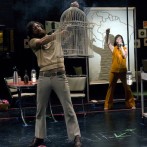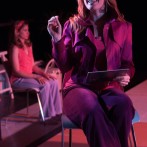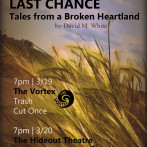In March, Spooky Action Ranch will host its very first artist in residence as part of the Nurturing New Ideas Series. The series has the goal of bringing artists and creators from all genres together to build support and provide a fertile haven for the development of new work in art, philosophy, and human experience. Our very first Artist in Residence will be Dr. David M White. David grew up in the hills of Southwest Missouri. He received a B.A. from New College of Florida before returning to his home state to earn a M.A. from the University of Missouri – Kansas City, and a Ph.D. from the University of Missouri – Columbia. In 2004, he helped found the Generous Theater Company (then Immanent Eye Theater) which took one of the Last Chance plays, Trash, to the 2005 New York International Fringe Festival. Last week I had the opportunity to chat with playwright Dave White about his work and his upcoming workshops of Last Chance – Tales from a Broken Heartland. Last Chance is an ambitious project, can you tell me a little about the origins of the concept? For years before Kevin Spacey identified people’s desire to gorge themselves on viewing a television series, I have participated in “binge-viewing” of my favorite shows (Twin Peaks, Firefly, Slings and Arrows, The Wire) consuming whole VHS tapes or DVDs at a time rather than bite size portions. In 2002, as I was writing Ain’t Nothin’ Quik ‘n Easy and Watersheds, the second and third plays I wrote in the series, I started wondering why I wasn’t finding this same joy in the theatre. Wouldn’t theatre audiences enjoy the longer story arcs and deeper character development that I was seeing in television programs? What if a theatre series focused on a community as a hero rather than a character, would audiences invest/see more deeply into their own communities? If a series of plays was able to gather an audience to see two or three episodes a week, that would create a new community of people, but in life, not just through virtual mediums sharing thoughts and reactions. The theatre serial seemed to combat the consumable and disposable nature of theatre: arrive early to say hello and be seen, watch a show, leave after and perhaps discuss it, but more likely go home and go to be, it’s late after all. I want audience members to invest because they know there’s more to the story to be discovered. What is, in your estimation, the purpose of art? How do you strive to meet this purpose in your own work? I don’t know that art has a purpose, perhaps the artist has a purpose and the viewer has...
Read More




